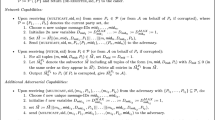Abstract.
A naming protocol assigns unique names (keys) to every process out of a set of communicating processes. We construct a randomized wait-free naming protocol using wait-free atomic read/write registers (shared variables) as process intercommunication primitives. Each process has its own private register and can read all others. The addresses/names each one uses for the others are possibly different: Processes p and q address the register of process r in a way not known to each other. For \(n\) processes and \(\epsilon > 0\), the protocol uses a name space of size \((1+\epsilon)n\) and \(O(n \log n \log \log n)\) running time (read/writes to shared bits) with probability at least \(1-o(1)\), and \(O(n \log^2 n)\) overall expected running time. The protocol is based on the wait-free implementation of a novel \(\alpha\)-Test&SetOnce object that randomly and fast selects a winner from a set of q contenders with probability at least \(\alpha\) in the face of the strongest possible adaptive adversary.
Similar content being viewed by others
Author information
Authors and Affiliations
Additional information
Received: September 1994 / Accepted: January 1998
Rights and permissions
About this article
Cite this article
Panconesi, A., Papatriantafilou, M., Tsigas, P. et al. Randomized naming using wait-free shared variables. Distrib Comput 11, 113–124 (1998). https://doi.org/10.1007/s004460050045
Issue Date:
DOI: https://doi.org/10.1007/s004460050045




